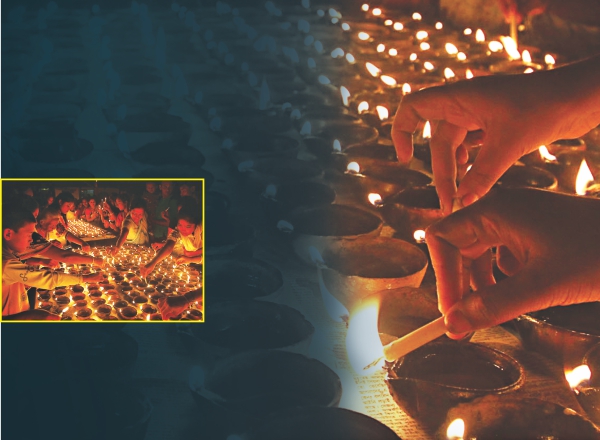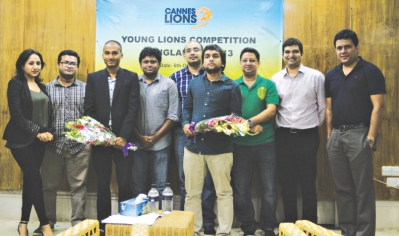
Learning from Ramu
By Anashua
Photo: Star Archive
Long after the smoke had settled around the serene, defaced Buddha, long after the fire had gone out, little flames leapt up in the dark. Where there should have been bright, floating lanterns and festivities, there are rows of flickering candles and silent people. Standing in the Shaheed Minar grounds, miles away from Ramu, it was hard to imagine how a crowd had turned on the Buddhists there, on the night of another festival. We were in a sense cut off from the Ramu people; it was right after Eid and Puja, the far away incident was dimmed in our memory. The crowd was small, and most of it seemed to be made of bored onlookers who had gathered there because they expected something to happen.
After the lighting of the candles, there was a speech which could hardly be understood, and a few songs. Though surprisingly, throughout all of this, the organisers seemed to be evading the main, most painful aspect of the Ramu attack, that it was not a simple act of religious hatred. The Buddhists had been living in Ramu for hundreds of years without any violence. What we saw on 29th September was violence with a political motive; something that had sparked around a fake, photoshopped Facebook page, and was carried out by hired thugs from outside. There were locals who risked their lives to protect the Buddhists, there were bearded men who saved the children of a local orphanage. Suddenly schools that avoided religious topics like the plague were discussing it. We had no reason to be sorry about living in a fundamentalist society.
It's sad that our government barely tried to identify the real people who caused this. After the initial opposition-blaming, some of the thugs were arrested, but the darker force in working was never mentioned. Seeing this lack of initiative in helping the Ramu people, a group formed by the youth, Red Blood took it upon themselves to collect money, clothes, food and stationery to distribute among the people whose houses and schools were burnt down. In certain cases, actions outweigh words. We finally had a substantial way of saying sorry to the children who hid in cramped rooms as their school was destroyed.
What Red Blood did for Ramu was great, and in the end, good deeds shine through. “If the need arises in the future, we are always going to be there to help the nation,” assures a Red Blood spokesperson. Like the stoic, ancient Buddha towering above the ruin, it's through our activities that we rise above ourselves. There's hope in knowing that we are the generation that's making the change; while some people use Facebook to raise hell, others use it to unite and connect. In moments of crisis, when our nation's image is tarnished and tainted, these people give us a face to show.
Hear Me Roar
By Ahsan Sajid
The first dilemma I faced after becoming the runner-up at the Cannes Young Lions 2012 was who to call first. Maybe home. Maybe my girlfriend. Maybe my colleagues who have been waiting at the edge of their seats all day. Instead I called my driver, who had also been waiting for a good few hours and after telling him, ar dosh minute darao, o ar ami dui number hoisi, I went back in trying to shake off my daze. Word had spread; I was getting phone calls by now but the dilemma of the first phone call was over.
The next day I would be turning 22, and it was the proudest moment of my career. The rest of the night is a blur of happiness, pride and anticipation to me now. Shuvam bhai and I had become runner-up at the Cannes Young Lions 2012 representing The Daily Star. Hosted by Bangladesh Brand Forum each year, it is the local chapter of the world's largest gathering of communications professionals, the famous Cannes Lions International Festival of Creativity.
 The day of the competition I was sick with worry. I wasn't worried about my ability; I have never worried about my ability. But I knew that this was beyond anything I had ever experienced and that I would be out of my element among much more experienced individuals who do this kind of work on a daily basis.
The day of the competition I was sick with worry. I wasn't worried about my ability; I have never worried about my ability. But I knew that this was beyond anything I had ever experienced and that I would be out of my element among much more experienced individuals who do this kind of work on a daily basis.
A competition of this calibre naturally attracts the cream of the industry, and as expected all the top ad agencies were present. Shuvam bhai and I looked at each other constantly and then across the room, the only non-agency group in this sea of young talent. But we promised ourselves we were going to soak up every experience and knowledge to be had, and have fun doing it.
Our objective, for which we received 8 hours of seclusion, was to develop a print campaign to provide incentive to the urban youth to educate the unprivileged. Our aim was to use existing resources to attempt solving this problem - the youth. I fell in love with it. This was the kind of work I got into the field for. Shuvam bhai and I immediately began pacing and brainstorming.
Within an hour we had our finger on it. Education is not restricted to the classroom. Education can be elicited as well at home as in a basketball court. Education can be in the form of knowing your current affairs to knowing the rules of a sport. Shuvam bhai immediately got to work on the visual (the intricacy we had planned would require a lot of dedication) as I set out to write the text for the campaign and prepare our presentation.
After 8 gruelling hours and 3 amazing presentations, it was The Daily Star, number 4's turn. I was scared. The previous presentations were amazing. But we believed in our campaign, and we felt very passionately about it. We had the fortune of being able to discuss it from a very close place.
Once all 9 teams were done presenting and the panel went away to deliberate on the judgment, I faced a strange moment. I felt competitive and wished they would all do poorer than us, but I felt so proud to be one of them.
When we heard our names spoken out I was in disbelief, and did not get up immediately to save myself a Zoolander-type situation. But we were in fact the first runner-up and with nervousness, we received our flowers as the compère announced to everybody that we would be going to Spikes Asia Festival of Creativity 2013, the largest ad festival in the region that awards creative excellence in advertising. One could not have wished for a prettier cherry on top.
The winning team were from Unitrend, and I had tremendous respect for their print campaign. The judges included Rajeeb Bhattacharjee, marketing director of Grameenphone, Kazi Inam Ahmed, director of Gemcon Group, Preema Nazia Andaleeb, visual artist and creative director of Bangladesh Brand Forum, Shahriar Amin, marketing manager of Philip Morris Services India SA, and being validated by such esteemed company alone was worth a lifetime of pride.
I took away a completely new experience, bragging rights, new friends, confidence, and getting to hear from Ms. Andaleeb that I am a great presenter (a strength I work exceedingly hard at to sharpen). Next year when we are at Spikes Asia in Singapore, we will fight to put Bangladesh on the map and we can't wait for the chance to go at them all.
(Sajid works in Marketing in The Daily Star, is a Content Developer for a PR firm, a final year literature student at NSU and most importantly is an ex RS writer.)
